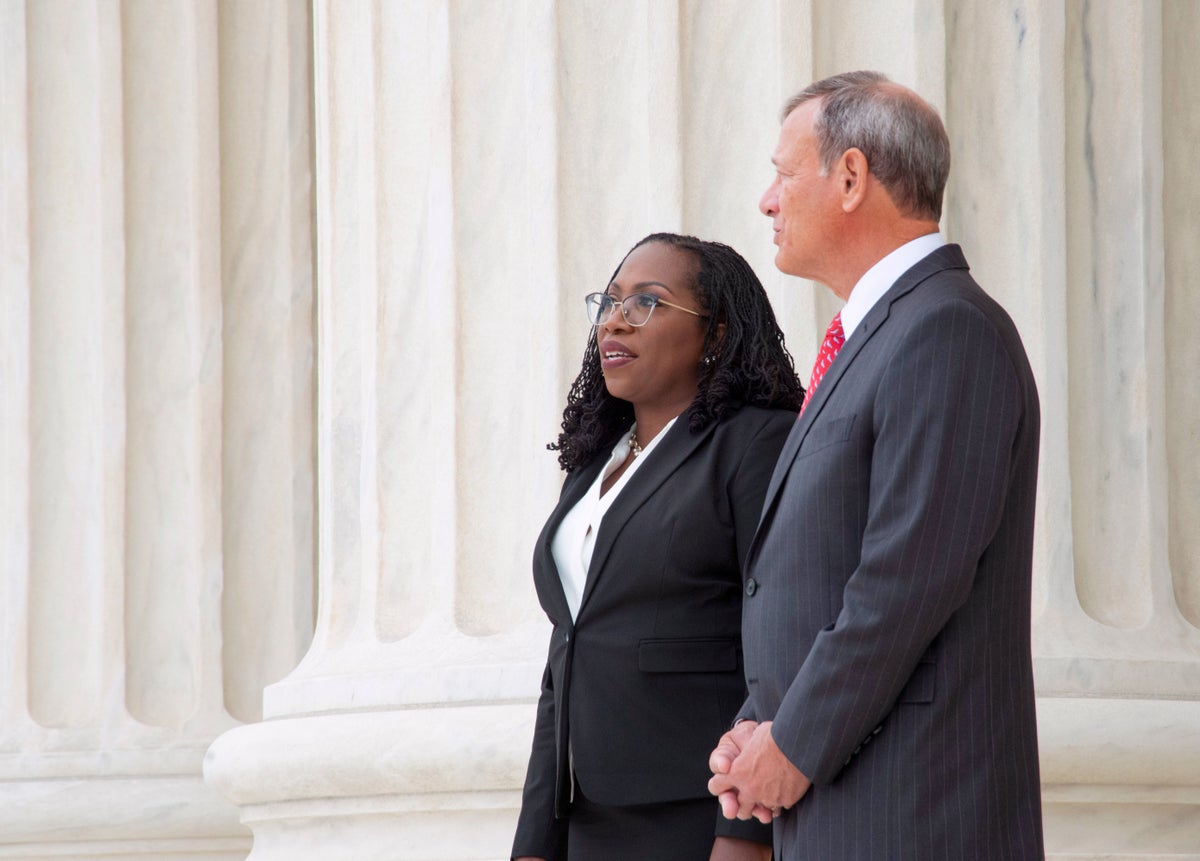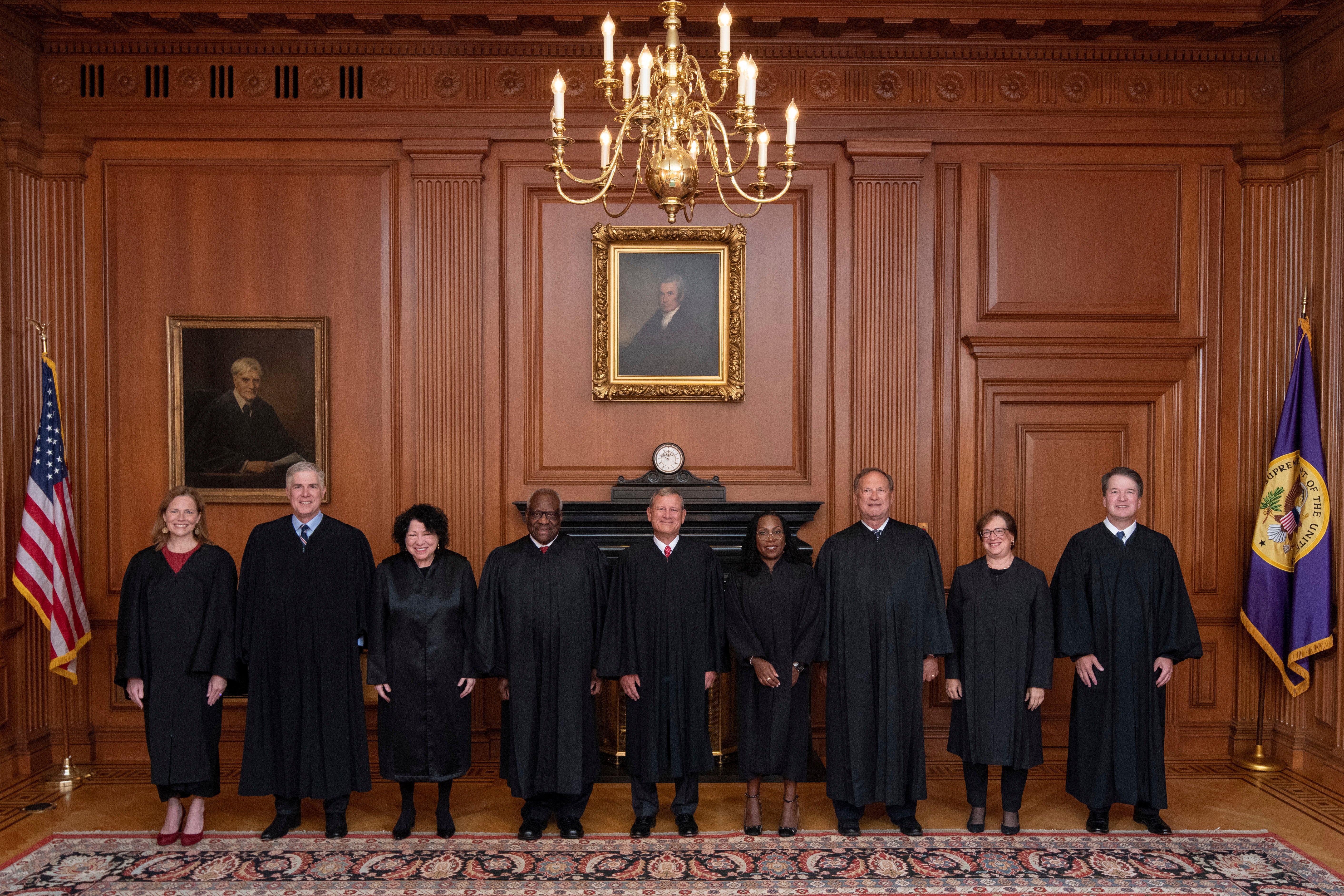
US Supreme Court Justice Ketanji Brown Jackson was formally introduced last week as the high court’s newest justice, the first Black woman and first former public defender confirmed to the nine-member panel.
Her appointment, confirmation and inauguration were lauded by civil rights advocates and pro-democracy groups.
But the Supreme Court returns this fall in the the turbulent aftermath of its previous term, concluding with a streak of controversial rulings from the conservative-majority court, derided by the White House for its “extremist” blows to the climate crisis, abortion rights, protections against gun violence, and the increasingly fragile firefall between church and state.
At the conclusion of that term, President Joe Biden warned that the court is “committed to moving America backward, with fewer rights and less autonomy”.
In front of the justices this fall are two major voting rights cases that analysts fear could pose existential challenges to American democracy. The conservative-majority court – with three justices appointed by Donald Trump – also will consider cases involving environmental protections, LGBT+ rights, immigration, affirmative action and Indian sovereignty.
Trust in the Supreme Court is also at an all-time low. A record number of Americans – 58 per cent – disapprove of the job the court is doing, and 42 per cent of Americans believe the court is too conservative, a record high for that response, according to the Gallup survey.
Justice Elena Kagan warned this summer that lost confidence in the court is a “dangerous thing for a democracy” as its legitimacy comes into question.
“The way the court retains its legitimacy and fosters public confidence is by acting like a court” and “doing the kinds of things that do not seem … political or partisan,” she said.
Meanwhile, the wife of Justice Clarence Thomas has been interviewed by the committee investigating the violent attempt to overturn the results of the 2020 election for pushing Donald Trump aides and Republican officials to challenge the outcome.
The court is also still investigating the leak of the opinion in a landmark case to revoke the constitutional right to abortion care, which has compounded stress at the court and fueled partisan media scrutiny and Republican officials’ demands to identify and prosecute the “leaker”.
But for the first time since the onset of the Covid-19 pandemic, members of the public and the press will be able to attend opening arguments in person this term.
Chief Justice John Roberts told an audience in Colorado this summer “the more normal the better” when it comes to matters at the court, but the modern court and its conservative majority are the result of a years-in-the-making reshaping of the federal judiciary by Republican officials and right-wing legal groups to reach this exact moment.
The future of the Voting Rights Act
The court begins its fall term with a challenge to Alabama’s congressional redistricting map, after state lawmakers created just one majority-Black district for the US House of Representatives – out of seven – despite Black residents making up more than a quarter of the state’s population.
In a 5-4 decision earlier this year, the Supreme Court allowed the map to stand, despite a federal court ruling that found that the maps discriminate against Black voters.
Alabama is back at the Supreme Court, teeing up a battle over the future of the Voting Rights Act and racial gerrymandering in Merrill v Milligan.
The state argues that it cannot make an explicit consideration of race in the redrawing of the map, which Alabama argues would mark an unconstitutional consideration of race as the predominant factor.
“This flies in the face of everything the Voting Rights Act stands for,” according to Michael Waldman, president of the Brennan Center for Justice at the New York University School of Law. “The case could represent yet another insult to the venerable Voting Rights Act and could dull the most effective remaining safeguard against racial discrimination in redistricting.”
The court already has stripped key provisions in the landmark civil rights law, including a requirement that states with histories of discrimination get approval from the US Department of Justice before they change their election policies.
Voting rights advocates and civil rights groups are bracing for the right-wing majority to gut what remains of the law, initially signed in the bloody aftermath of the civil rights movement in 1965. In Congress, Republicans have repeatedly shot down attempts to bolster voting rights and preserve the landmark civil rights law.
If the Supreme Court agrees with Alabama’s argument to radically rewrite a crucial section of that law, it will be all but impossible for minority voters to challenge political boundaries that are more likely to dilute their political power.

In her furious dissent to the majority’s decision earlier this year, Justice Kagan said the ruling “does a disservice to Black Alabamians” who “have had their electoral power diminished – in violation of a law this Court once knew to buttress all of American democracy.”
The lower court ruled that “Black voters have less opportunity than other [Alabama residents] to elect candidates of their choice to Congress” and that any “remedial plan” would need to include at least two districts with majority-Black voters.
The GOP’s election conspiracy theories
Ginni Thomas, the wife of Supreme Court Justice Clarence Thomas, continues to believe Mr Trump’s ongoing false claim that the 2020 presidential election was stolen, according to the House select committee investigating the attack on the US Capitol fuelled by the same lie.
Her opening statement to the committee, obtained by The New York Times, claims that the couple maintain an “ironclad” agreement to avoid discussing cases.
“It is laughable for anyone who knows my husband to think I could influence his jurisprudence – the man is independent and stubborn, with strong character traits of independence and integrity,” she said.
Justice Thomas, however, was the only justice who opposed an order that would grant the committee to access hundreds of Trump White House documents – including text messages sent by Ginni Thomas to Mr Trump’s chief of staff Mark Meadows.
Those messages urged Mr Meadows to pursue efforts to overturn the results of the election, undermining and dismissing millions of Americans’ votes to seat Mr Trump for a second term.
She also pressed state lawmakers in Arizona to ignore Mr Biden’s victory and “choose” their own electors who are loyal to Mr Trump.
After elections analysts called the race for Mr Biden in Arizona in November 2020, Ms Thomas called on 29 state lawmakers to reject the outcome, telling them in emails to “stand strong in the face of political and media pressure” and claiming that the responsibility to choose electors was “yours and yours alone.”
They have the “power to fight back against fraud” and “ensure that a clean slate of Electors is chosen,” she wrote.
This fall, the justices will weigh in on the validity of the “independent state legislature” theory, promoted by Trump allies like John Eastman, whose radical and dubious legal arguments animated the former president’s attempts to toss out the 2020 election.
According to the theory, partisan state legislators – not the courts – would have effective control over the electoral process. If the court adopts the theory, it would radically reshape how federal elections are performed, potentially handing control of elections to GOP lawmakers rather than state courts and election officials.
The theory comes into question in the case of Moore v Harper, which involves another major redistricting case, this time involving partisan gerrymandering in North Carolina.
The state’s Supreme Court rejected state lawmakers’ congressional map and the “independent state legislature” argument to defend it, calling it “repugnant to the sovereignty of states, the authority of state constitutions and the independence of state courts, and would produce absurd and dangerous consequences.”
Last month, chief justices from state Supreme Courts across the US made a rare plea to the high court urging justices to reject the theory. They wrote that the Constitution “does not oust state courts from their traditional role in reviewing election laws under state constitutions.”
Without such barriers, courts will be “flooded with requests to second-guess state court decisions interpreting and applying state elections laws during every election cycle, infringing on state sovereignty and repeatedly involving the federal judiciary in election disputes,” the chief justices wrote in their brief to the court.
Earlier this year, conservative Supreme Court Justices Alito, Thomas and Neil Gorsuch suggested that they could defend the theory, arguing that it presents an “exceptionally important and recurring question of constitutional law.”
Environmental protections
The first case of the Supreme Court’s fall term is another major environmental test in the wake of last term’s West Virginia v Environmental Protection Agency, which dealt a significant blow to government efforts to combat the climate crisis by ruling that Congress did not explicitly empower the Environmental Protection Agency to issue sweeping regulations under the Clean Air Act.
Sackett v EPA involves the Clean Water Act, and brings a 14-year-old legal battle to the high court to ask where the federal agency’s reach comes to an end.
A ruling in favour of the plaintiffs could open the door for pollution massive development projects on and near the nation’s fragile wetlands, and contaminate the interconnected streams and waterways that are otherwise protected from the impacts of mining, oil and gas and other industries.







